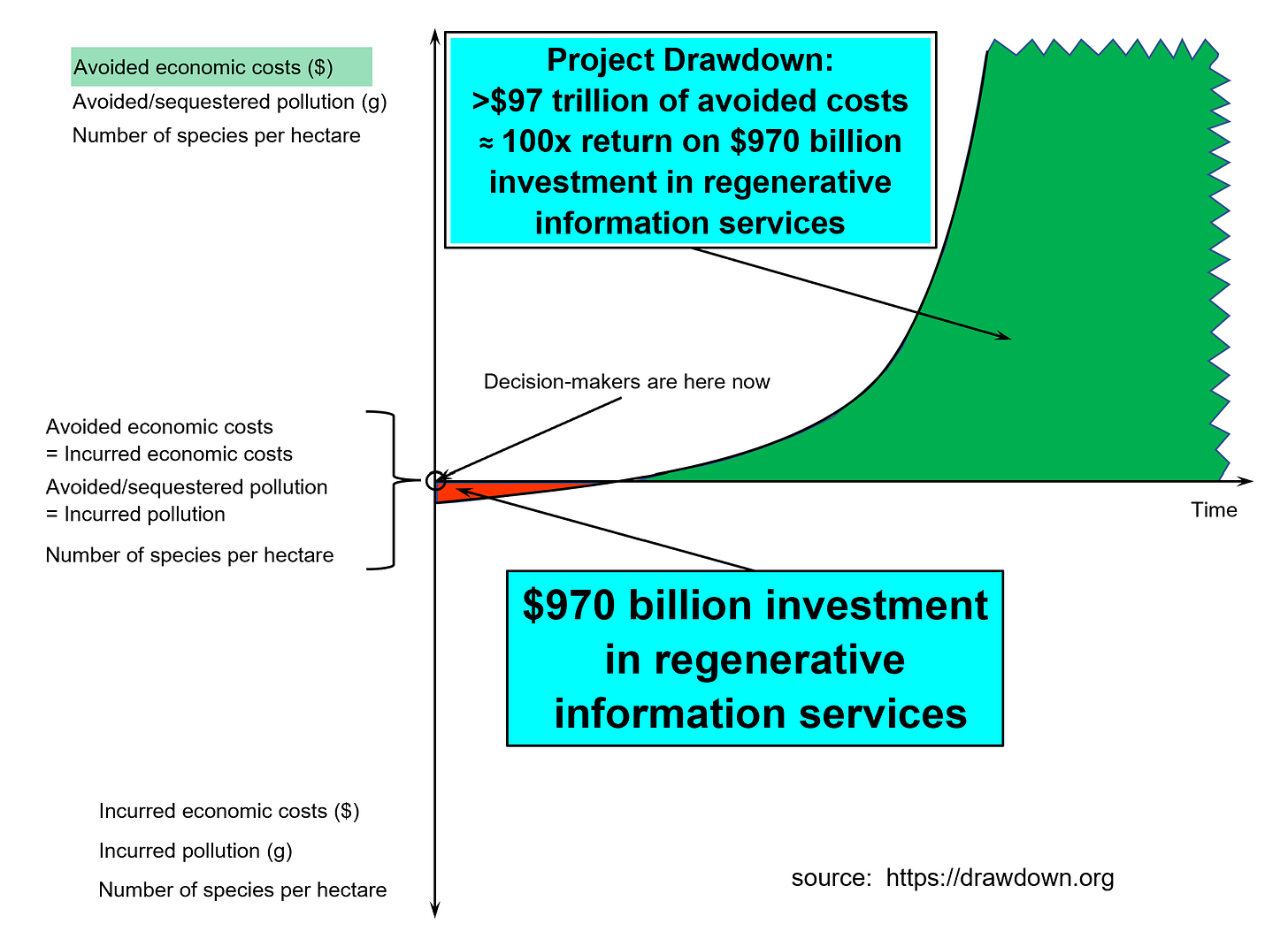Regenerative Information Services for Reversing the Planet’s Eco-crises
Chapter 11 from We Can Reverse the Planet's Eco-crises
Very few pathways create 10x. With genuine reflection, a 10x target spotlights the few pathways—the high-leverage strategies and relationships – with extreme upside.
– Dan Sullivan and Dr. Benjamin Hardy
Here’s the good news for reversing the planet’s eco-crises: we have an abundance of regenerative options.
Project Drawdown showed that we have available to us 93 kinds of regenerative options that – when widely adopted – were estimated to deliver more than $97 trillion of avoided costs and more than 1 trillion tons of avoided carbon pollution …
In other words, Project Drawdown estimated those regenerative options to deliver an extreme upside on a scale of $97 trillion of avoided cost savings …
… and estimated those same regenerative options to deliver an extreme upside on a scale of 1 trillion tons (1000 gigatons) of avoided carbon pollution …
With more than $97 trillion of avoided costs – and more than 1 trillion tons of avoided carbon pollution – waiting to be won, the planet’s eco-crises have hidden with them an opportunity so powerful that it literally dwarfs the ecological crises …
To win those “extreme upsides” through extremely simple regenerative-decision-making, decision-makers everywhere are going to need a new & simple kind of information services – called “regenerative information services” -- in the form of:
accurate evaluations, comparisons and measurements
of performance benefits, economic benefits and regeneration benefits
of Things-We-Extract options and Thinggs-We-Use options for meeting human physical needs …
To provide those regenerative information services and deliver those trillions of extreme upsides, entrepreneurs (like you) are going to be needed …
… first, to design, build and use an extremely simple (but very large) database (called a “regenerative database”) containing:
performance data
incurred cost data
number of species per area data &
incurred pollution data
for Things-We-Extract options and Things-We-Use options on an option-by-option basis:
… and second, to design, build and use an extremely simple computer-implemented application (an “app”) – usable by people everywhere – for processing the data and delivering regenerative information services – to people everywhere -- in the form of:
accurate evaluations, comparisons and measurements
of performance benefits, economic benefits and regeneration benefits
of Things-We-Extract options and Things-We-Use options for meeting human physical needs …
Here’s the good news about an app for delivering regenerative information services …
We, as human beings, are really good at creating devices for processing vast amounts of data into usable information. We also are really good at creating apps for communicating that usable information to human beings everywhere.
An app that delivers regenerative information services to decision-makers everywhere -- for reversing the planet’s eco-crises (including the climate crisis) -- is well within our technological and informational capabilities.
From an investment point of view, reversing the planet’s ecological crises (including the climate crisis) might look like entrepreneurs (like you) investing $9.70 billion in a regenerative database & app for delivering an extreme 100x upside in the form of $970 billion of regenerative information services[1] …
… and might look like entrepreneurs (like you) providing $970 billion of regenerative information services for delivering an extreme 100x upside in the form of $97 trillion of avoided cost savings and 1 trillion tons of avoided carbon pollution …
To recap: reversing the planet’s eco-crises as a whole (including the climate crisis) might look like extremely simple regenerative decision-making delivering extreme upsides on a scale of $97 trillion of avoided costs and 1 trillion tons of avoided carbon pollution.
Steve Jobs might have put it this way:
“Simple can be harder than complex: You have to work hard to get your thinking clean [to make a simple map of the decision-making system that’s creating the planet’s eco-crises, to use that map to design a simple decision-making process for reversing the planet’s eco-crises, and to design, build & use a simple database & app allowing people everywhere to use that simple decision-making process for winning trillions of extreme upsides]. But it’s worth it in the end because once you get there, you can move mountains [and reverse the planet’s eco-crises as a whole].”
[1] To put a nominal $970 billion market for regenerative information services in context, the market capitalization as of June 2020 for Google – the world’s 3rd largest provider of information services -- was approximately $980 billion. In other words, regenerative information services has the potential to be a trillion dollar information services industry on a par with Google.
In the next chapter of We Can Reverse the Planet’s Eco-crises, you will learn how regenerative decision-making reverses the planet’s ecological crises and makes present-day decision-making obsolete.
I’m super grateful for your likes, replies and shares.
Thank you for reading and aloha!
P.S. I cross-posted this article on Medium to give it greater reach.
















